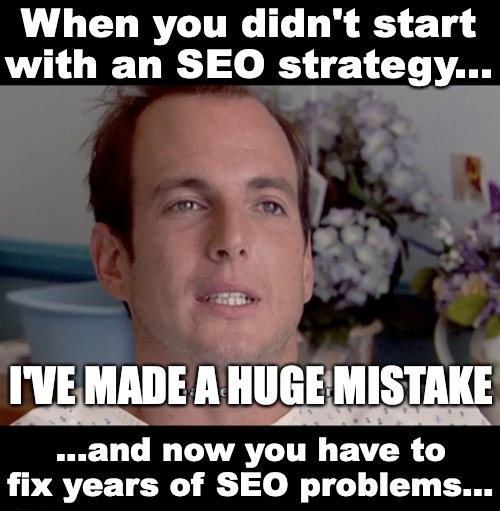SEO Pt 2: 3 Biggest SEO Mistakes We Made + 3 Tips for You (with Noah Riggs)
We’ve probably said this a thousand times now, but we made some big mistakes with SEO when we first started Create and Go.
Mistakes that haunt us to this day, and will continue to haunt us for some time, I’m sure.

In our last episode, we talked about our dark history with SEO, and how Noah and Alex managed to dig us out of the hole we accidentally made for ourselves.
Y’all, I can’t tell you how much it hurts me to think of all the time, effort, energy, and money we could have saved (and how much more successful we could be even today) if we hadn’t blown off focusing on SEO in the beginning.
But we didn’t know what we didn’t know.
We were busy, excited, and honestly just running off the high from our major success…so we didn’t take the time to do the research, and honestly just didn’t think it mattered much.
It wasn’t that we didn’t know SEO was important (although we didn’t realize exactly how vital it was).
But we were doing so well with the traffic we drove from Pinterest and YouTube that we figured SEO was something we could focus on later.
We kicked the can down the road, and boy, did it come back to bite us!
Our strategies with social media were great in the short-term; but every blog needs a plan that includes SEO, or you won’t make it long-term. Period.
Today, Noah and I are going over:
- exactly where we went wrong,
- the three biggest mistakes we made,
- and how you can avoid them.
Ignorance might be bliss, but y’all…knowledge is power.
And SEO knowledge is the most powerful and valuable knowledge you can have in the blogging world.
We want you to empower you to get this right the first time, get an SEO strategy in place, and avoid making the major mistakes we made.
(But if you’re like us, and have already been kicking the can down the road, you can still fix it!)
In this episode, Part 2, Noah and I are discussing:
- Our mindset on traffic in the beginning
- Why we didn’t have an SEO plan at first
- The three biggest SEO mistakes we made when we started Create and Go
- How our lack of knowledge and planning came back to bite us
- What you can do to avoid making the same mistakes we made
Listen to the full episode:
Episode Highlights:
- [1:43] Why we didn’t have an SEO plan in the beginning
- [2:31] SEO Mistake #1: Not starting with SEO in mind
- [4:03] Our strategy when we started, and why we didn’t think of SEO
- [5:53] Why you need an SEO strategy from the start
- [8:01] SEO Mistake #2: Not optimizing for multiple keywords and phrases
- [10:59] How to fix the problem, and why it’s so important to avoid this mistake
- [14:34] SEO Mistake #3: We didn’t know what we didn’t know
- [16:44] Why we don’t want you to make the same mistakes
- [17:40] Knowledge is power
- [19:28] SEO is a learning process
Resources and Mentions:
- Podcast: SEO Pt 1: Do You Need an SEO Strategy for Your Blog? [With Noah Riggs]
- Related Post: Blog SEO: 10 Step Beginner’s Guide to Ranking Blog Posts
- Related Video: SEO for Beginners: 10 Steps to get More Organic Traffic to Your Blog
- Tutorial: How to Start a Successful Blog
- Start your first blog with our Free 5-Day Start a Blog Challenge
Full Episode Transcript:
Did you enjoy the show?
- Don’t miss out on future episodes as soon as they’re released! Follow the podcast on Spotify and subscribe via Apple, Google, or Stitcher.
- If you want to say thanks or support us, please leave us a review in Apple Podcasts. We appreciate you!